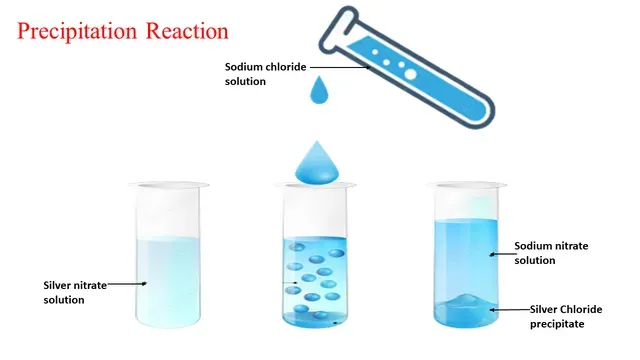Precipitation
reactions hold an important place in chemical science and are used in many
ways. Today we will learn what is precipitation
reaction? In this article, you will be able to know the definition, examples and
FAQs etc.
Precipitation Reaction definition
A precipitation reaction is a reaction in which
soluble ions of separate solutions are mixed together to form an insoluble
compound that settles down as a solid. This insoluble compound is called a
precipitate.
 |
| Precipitate Reaction |
What is a precipitate?
A precipitate is an insoluble solid substance which is formed when
two solutions are mixed together.
Precipitation Reaction Examples
1. Barium
chloride reacts with sodium sulphate to form barium sulphate and sodium
chloride. Barium sulphate is precipitate.
`BaCl_2 +Na_2SO_4→ BaSO_{4(s)} + 2NaCl`
2. When
carbon dioxide is passed in calcium hydroxide, a white precipitate of calcium
carbonate is formed.
`Ca(OH)_2 +CO_2→ CaCO_{3(s)} + H_2O`
3. Reaction
between silver nitrate and sodium chloride produces a precipitate of silver
chloride and sodium nitrate remains as an aqueous solution.
`AgNO_3
+ NaCl → AgCl_{(s)} + NaNO_{3(aq)}`
4. Solution
of lead nitrate and potassium iodide are mixed together, and a precipitate of lead
iodide is formed in the reaction.
`Pb(NO_3)_{2 (aq)} +
2KI_{(aq)} → PbI_{2(s)} + 2KNO_{3 (aq)}`
5. When
calcium chloride and sodium carbonate solutions are mixed with each other, the resulting precipitate of calcium carbonate and sodium chloride remains in the solution.
`CaCl_{2 (aq)} + Na_2CO_{3
(aq)} → CaCO_{3(s)} + 2NaCl_{(aq)}`
Are all precipitation reactions double displacement reactions?
When two aqueous solutions are mixed together, resulting in the formation
of an insoluble solid called a precipitate, these are precipitation
reactions and the exchange of ions takes place so also called double displacement
reactions.
So, all precipitation reactions are double displacement reactions.
Are all double displacement reactions precipitation reactions?
All double displacement reactions do not involve the formation
of a precipitate. Some double displacement reactions result in the formation
of soluble products which means no precipitate forms, so these double displacement
reactions are not called precipitation reactions
Related Topics
1. What happens during a chemical reaction
FAQs
1. How
do you identify a precipitation reaction?
Ans. – If an insoluble solid substance is formed during a chemical reaction, then it must be a precipitation
reaction.
2. What
is an ionic precipitation reaction?
Ans. – When a solid precipitate is formed through the exchange of
ions between two ionic solutions, the reaction is an ionic precipitation reaction.
3. What
are precipitation reactions used for?
Ans. – Precipitation reactions are used for Qualitative analysis,
Water treatment, Synthesis of new compounds, Removal of pollutants, Production
of pigments, pharmaceutical purposes etc.
4. How do
you write a precipitation reaction?
Ans. - AB + CD → AD +
CB
5. Why
is the precipitation reaction also called a double displacement reaction?
Ans. – In the double displacement reactions, there is an exchange of
ions between two compounds and resulting in the formation of two new compounds.
The same thing happens in the precipitation reactions so they are called
double displacement reactions.
6. When
do precipitation reactions occur?
Ans. – Precipitation reactions occur when two aqueous solutions
are mixed together, and ions of both solutions exchange to form a precipitate.
7. What
causes precipitation reaction?
Ans.- solubility of the compounds and the interaction between ions
cause precipitation reactions to occur.
8. Is
a precipitate soluble?
Ans.- No, a precipitate is not soluble.
9. Is
a precipitate solid?
Ans.- Yes, a precipitate is a solid substance.
.jpg)

.webp)

No comments:
Post a Comment